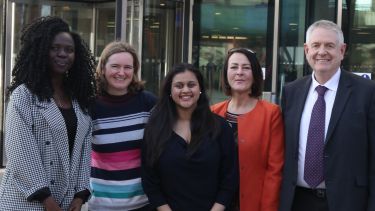Currently women make up just 9% of the UK’s engineering workforce, something the University’s Women in Engineering project is working to address.
Led by Dr Gwen Reilly, herself a bioengineer, the Women in Engineering team have been able to deliver three key activities thanks to AESSEAL’s support:
- Raising awareness of engineering and encouraging more girls to study STEM subjects in primary schools through the ‘Engineering Is’ campaign
- Providing an entry route into engineering degrees for girls who have not studied Physics at A-Level
- Supporting female academics as they progress through their careers into senior positions to ensure representation and role models at all levels of the University
Dr Reilly explained:
“We need to show young people that engineering is an accessible and exciting career and we do this by celebrating a diverse workforce.”
Professor Mike Hounslow, Vice-President and Head of Engineering, agrees.
“We need to be talking to kids in primary school about what engineering is and what engineers do, particularly to girls,” he says. “They make up half the population, they should make up half the engineers.”
Launched in the Houses of Parliament, the ‘Engineering Is’ campaign saw resources created for schools by female engineering students from the University to support lessons and introduce the concept to younger school children. Thanks to AESSEAL’s continued support this project will be continued and expanded to further raise awareness among teachers and parents of primary school aged children.
A pilot ‘Engineering Pathway’ scheme was also put into place to support high-quality applicants to engineering degrees who had not studied Physics at A-level. These applicants were offered a place on a 3-week Physics course run by the University just before the start of the academic year.
The successful pilot saw thirteen students participating (seven fully funded by AESSEAL) and is now being rolled out more widely and included in the University’s recruitment messages. It was also found that a number of other female students on open days said they were more likely to apply to Sheffield thanks to the inclusive environment promoted by the University.
The final area dealt with supporting the progression of female academics within engineering. After speaking to focus groups of early and mid-career academics, two key hurdles were identified in their career progression: knowing when and how to best apply for promotions, and restrictions on their ability to travel and network to boost their research profile.
After these were identified tailored courses were put in place for female academics, with more planned for the future, and a Women Engineers Network was formed for female academics to share their experiences and advice in progressing up the career ladder.
The work is having a positive impact, as Dr Reilly explains:
“We have already seen an increase in the number of females studying engineering at Sheffield with our home undergraduate intake being at 23% female in 2018, up from 18% in 2016.”
“We are enormously grateful that AESSEAL have chosen to support the University of Sheffield Women in Engineering programme and we look forward to continuing and building our relationship and projects with them for years to come.”
All of these projects would not be possible without the funding, or the support, given by AESSEAL, and in particular the commitment from the founder and Managing Director of AESSEAL, Chris Rea, and from Stephen Shaw, the Group Engineering Director at AESSEAL. AESSEAL kindly hosted the Women in Engineering student society at their headquarters where Chris Rea gave an inspiring talk about entering into business and Stephen Shaw was an invited speaker at the society’s annual ‘Inspiration Panel’ event promoting careers in engineering.
Stephen explains:
“Working in industry we see the need to improve the gender balance across all engineering disciplines, and as has been demonstrated by the University we know the ability is there among the next generation of students. We are proud to be doing our part to level the playing field, and open up our sector to women from whose talent we can only benefit.”

